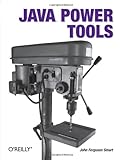John Smart
Author of Java Power Tools
John is an experienced consultant and trainer specialising in Enterprise Java, Web Development, and Open Source technologies, currently based in Wellington, New Zealand. Well known in the Java community for his many published articles, and as author of Java Power Tools, John helps organisations around the world to optimize their Java development processes and infrastructures and provides training and mentoring in open source technologies, SDLC tools, and agile development processes.Presentations
Completing the circle - Automated web tests as a team communication tool
8:30 PM MDT
Acceptance Test Driven Development, or ATDD, has proven to be a very effective technique, both for driving and guiding development, and for enhancing communication between developers and other project stakeholders. But why stop there? Well designed Acceptance Tests can also act as a formidable documentation source and communication tool. Indeed, when written in a narrative, BDD-type style, Acceptance Tests have the potential to document in detail how the user interacts with the application.
In this talk we will look at the role of automated Acceptance Tests not only for testing, but also as part of the whole development lifecycle, from writing the user stories right through to deploying the application. We will also look at ways to make your automated acceptance tests more expressive and how to use them more effectively as a communication, reporting and documentation tool.
Finally, we will present and demonstrate a new open source library that helps developers and testers write automated acceptance tests for web applications using WebDriver/Selenium 2. This library also produces clean, narrative-style reports illustrated with screenshots that effectively describe the application's functionality and behaviour, as well as any regressions or pending features.
JUnit Kung Fu: Getting More Out of Your Unit Tests
5:00 PM MDT
JUnit is the de facto standard in Java testing. Yet many advanced JUnit features are little known and poorly understood. This session reviews some lesser-known features of JUnit, along with a few associated libraries, that can make your unit tests more powerful, expressive, and fun. The session is intended for Java developers, lead developers, and architects trying to introduce good testing practices into their teams.
Attendees will learn about the latest JUnit tips and tricks, including:
- The fine art of naming your tests
- Writing clearer and more expressive tests with Hamcrest and Mockito
- Data-driven testing in JUnit with parameterized tests and theories
- Using JUnit rules to extend your test cases and writing your own rules to customize JUnit
- Extending JUnit by writing your own test runners
Jenkins Continuous Integration in Action
9:00 AM MDT
The team dynamics and agile process revolution of the last several years has taught us that continuous integration (CI) is a necessary part of a healthy agile team. Jenkins (formerly Hudson) is the idea and footprint leader in the CI space. A recent survey stated that over 70% of all CI installations have Jenkins in their DNA. What's so awesome about this particular CI tool?
Get on board with a ground-up survey of how to install, apply, upgrade, and leverage the free an open source Jenkins Continuous Integration server for your build, whether it be Ant, Maven, Gradle, JavaScript, Rake, or just shell scripts.
In this presentation, you'll learn how to add plugins for additional build and analysis phases, how to cluster Jenkins on a subnet for a swarm of CI servers that automatically load balance and collate reports, and lastly, how to manage Jenkins on a disparate set of OSes to natively test your unit and integration tests on all your supporter platforms.
Jenkins Continuous Integration in Action
10:45 AM MDT
The team dynamics and agile process revolution of the last several years has taught us that continuous integration (CI) is a necessary part of a healthy agile team. Jenkins (formerly Hudson) is the idea and footprint leader in the CI space. A recent survey stated that over 70% of all CI installations have Jenkins in their DNA. What's so awesome about this particular CI tool?
Get on board with a ground-up survey of how to install, apply, upgrade, and leverage the free an open source Jenkins Continuous Integration server for your build, whether it be Ant, Maven, Gradle, JavaScript, Rake, or just shell scripts.
In this presentation, you'll learn how to add plugins for additional build and analysis phases, how to cluster Jenkins on a subnet for a swarm of CI servers that automatically load balance and collate reports, and lastly, how to manage Jenkins on a disparate set of OSes to natively test your unit and integration tests on all your supporter platforms.
Books
Java Power Tools
by John Ferguson Smart
All true craftsmen need the best tools to do their finest work, and programmers are no different. Java Power Tools delivers 30 open source tools designed to improve the development practices of Java developers in any size team or organization. Each chapter includes a series of short articles about one particular tool -- whether it's for build systems, version control, or other aspects of the development process -- giving you the equivalent of 30 short reference books in one package.
No matter which development method your team chooses, whether it's Agile, RUP, XP, SCRUM, or one of many others available, Java Power Tools provides practical techniques and tools to help you optimize the process. The book discusses key Java development problem areas and best practices, and focuses on open source tools that can help increase productivity in each area of the development cycle, including:
- Build tools including Ant and Maven 2
- Version control tools such as CVS and Subversion, the two most prominent open source tools
- Quality metrics tools that measure different aspects of code quality, including CheckStyle, PMD, FindBugs and Jupiter
- Technical documentation tools that can help you generate good technical documentation without spending too much effort writing and maintaining it
- Unit Testing tools including JUnit 4, TestNG, and the open source coverage tool Cobertura
- Integration, Load and Performance Testing to integrate performance tests into unit tests, load-test your application, and automatically test web services, Swing interfaces and web interfaces
- Issue management tools including Bugzilla and Trac
- Continuous Integration tools such as Continuum, Cruise Control, LuntBuild and Hudson

